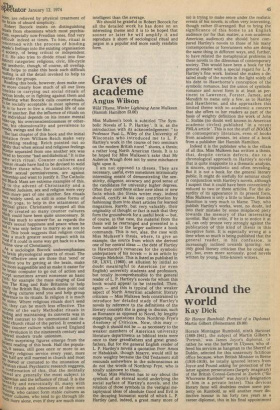Graves of academe
Angus Wilson
'Wild Thyme, Winter Lightning Anne Mulkeen (Hamish Hamilton £3.00) Miss Mulkeen's book is subtitled 'The Symbolic Novels of L. P. Hartley '. It is, as the introduction with its acknowledgement "to Professor Paul L. Wiley of the University of Wisconsin who introduced me to L. P. Hartley's work in the course of two seminars on the modern British novel" shows, a thesis; a rather long North American thesis. It is to be hoped for Miss Mulkeen's sake that Mr Auberon Waugh does not by some mischance light upon it. I am not opposed to theses. They are necessary, useful, even sometimes intrinsically interesting means of demonstrating the sensitivity, diligence, accuracy and good sense of the candidates for university higher degrees. Often they contribute either new ideas or new facts which the thesis writer may, indeed should, certify as his own contribution by fashioning them into short articles for learned magazines. Rarely, but very valuably, their originality of thought or fact is such that they form the groundwork for a useful book — but, of course, in that case, the material from the thesis will be rearranged and presented in a form suitable to the larger audience a book commands. This is not, alas, the case with Miss Mulkeen's thesis, where, to give an example, the source from which she derived one of her central ideas — the debt of Hartley to Hawthorne's romances for the symbolic underpattern of his novels — is an article by Giorgio Melchior. This is listed as published in SR, LXVL (1960), an allusion by initial no doubt meaningful to American (or even English) university students and professors, but totally incomprehensible to the general reader of L. P. Hartley's novels for whom this book would appear to be intended. Then, again — and this is typical of the weaker aspect of North American academic literary criticism — Miss Mulkeen feels constrained to introduce her detailed study of Hartley's novels by reference to the definitions of the literary concepts she is going to discuss, such as Romance as opposed to Novel, by lengthy supporting quotations from Northrop Frye's Anatomy of Criticism. Now, this may — though it should not be — as necessary to the weaker members of American university literature departments as biblical texts were once to their grandfathers and great grandfathers. But for the general English reader of L P. Hartley's novels a quotation from Amos or Habakkuk, though bizarre, would still be more weighty because the Old Testament still resounds somewhere in the subconscious as do not the words of Northrop Frye, who is totally unknown to them. What Miss Mulkeen has to say about the symbols of an eternal world underlying the social surface of Hartley's novels, and the relation of those symbols to the vestigial metaphysical ideas of absolute Good and Evil in the decaying humanist world of which L. P. Hartley (and, indeed, a great many more of us) is trying to make sense under the realistic events of his novels, is often very interesting, though rather ill-arranged. But to bring the significance of this home to an English audience (or for that matter, a non-academic American audience) she should have compared Hartley's novels to those of his many contemporaries or forerunners who are doing the same thing in different ways, and, further, to have related the metaphysical problems in these novels to the dilemmas of contemporary society. This would have been a book for the general reader with a special regard for L. P. Hartley's fine work. Instead she makes a detailed study of the novels in the light solely of his debt to Hawthorne's conception of the symbolic romance, but the union of symbolic romance and novel form is at least as pertinent to Lawrence, Forster, James, and Meredith to name only a few, as to Hartley and Hawthorne; and she approaches this limited theme with so academic a concern that she offers to her readers as part of the basis of weighty definition the work of John C. Stubbs (no doubt well known in American academic circles) published 'in a recent PMLA article'. This is not the stuff of BOOKS on contemporary literature, even of books from academic presses, let alone of a book from a publisher like Hamish Hamilton. Indeed it is the publisher who is the villain of all this. Miss Mulkeen has written a thesis, that, despite certain defects, due to a chronological approach to Hartley's novels that is quite inapposite to a thematic analysis, is sincere, sympathetic and often revealing. But it is not a book for the general literary public. It might do usefully for seminar study in conjunction with Hartley's novels, although I suspect that it could have been conveniently reduced to two or three articles. For the absurdity of its appearance in its present form, Miss Mulkeen is only a little to blame, Hamish Hamilton is very much to blame. They, who publish Hartley's works, were, no doubt, led into their mistake by some misplaced piety towards the memory of that interesting novelist. But the critic, if he is to notice it at all, can only protest very strongly against the publication of this kind of thesis in this deceptive form. It is especially wrong at a time when so much is being published that the general reader, in his confusion, is increasingly inclined towards ignoring: not only good literary criticism that he could enjoy, but, even more seriously, good novels written by young, little-known writers.


































 Previous page
Previous page